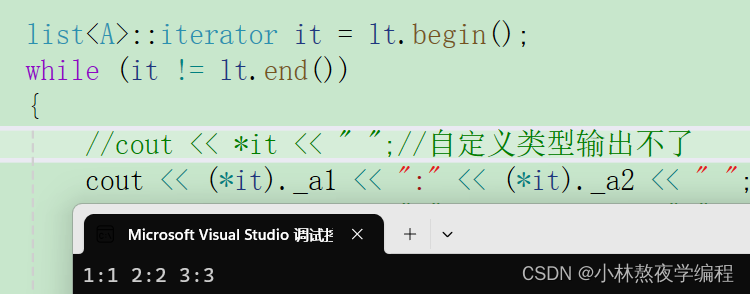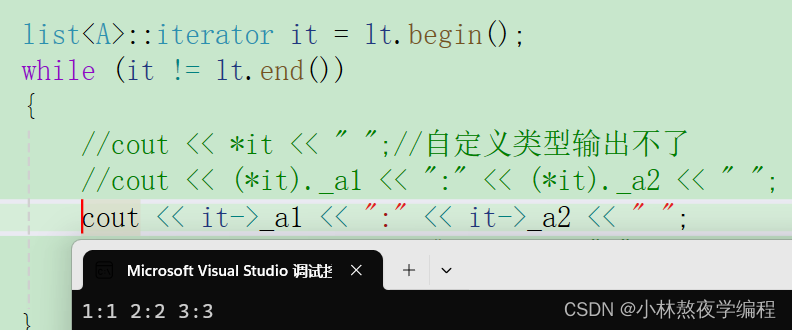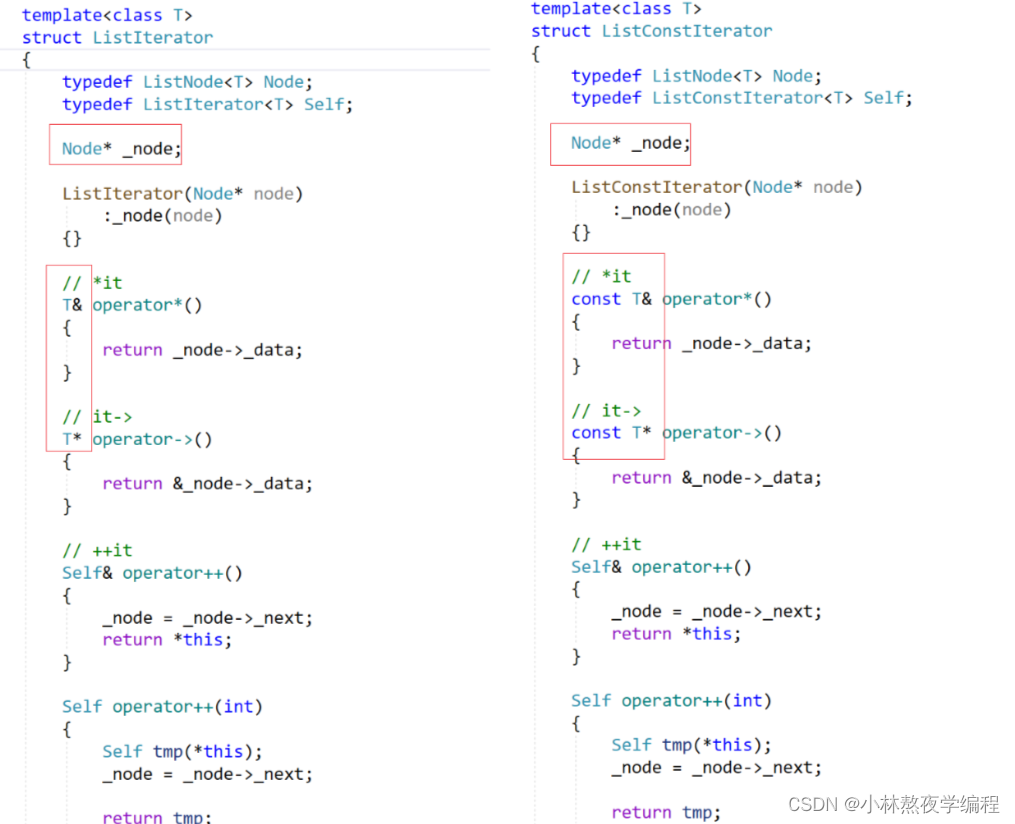
✨个人主页: 熬夜学编程的小林
💗系列专栏: 【C语言详解】 【数据结构详解】【C++详解】
目录
1、函数补充
拷贝构造
思路:
- 先构造一个头结点,然后将 lt 类中的元素依次尾插到新的结点上。
void empty_init() { _head = new Node; _head->_next = _head; _head->_prev = _head; _size = 0; } list(const list<T>& lt) { empty_init();//构造一个头结点 for (auto& x : lt) { push_back(x); } }{}初始化构造
思路:
- 先构造一个头结点,然后将 il 类中的元素依次尾插到新的结点上。
list(initializer_list<T> il) { empty_init(); for (auto& x : il) { push_back(x); } }赋值操作符重载
void swap(list<T>& lt) { std::swap(_head, lt._head); std::swap(_size, lt._size); } list<T>& operator=(list<T> lt) { swap(lt); return *this; }大小相关函数
size_t size() { return _size; } bool empty() { return _size == 0; }clear()
清空list的内容,保留头结点。
//清空数据 void clear() { iterator it = begin(); while (it != end()) { it = erase(it);//更新迭代器 } }~list()
析构函数,清空list的内容并释放头结点。
~list() { clear();//清空内容函数 delete _head;//释放头结点 _head = nullptr;//置空 }2、迭代器完善
前面我们处理的都是内置类型的情况,如果我们出现自定义类型,如何解决?
自定义类型举例:
struct A { int _a1; int _a2; A(int a1 = 0, int a2 = 0) :_a1(a1) , _a2(a2) {} };首先我们先看看几种自定义类型的尾插方式:
void test_list3() { list<A> lt; A aa1(1, 1);//实例化对象 A aa2{ 2,2 };//多参数的隐式类型转换,C++11 lt.push_back(aa1);//有名对象实例化 lt.push_back(aa2); lt.push_back(A(3, 3));//匿名对象 lt.push_back({ 4,4 });//多参数的隐式类型转换,C++11 }对自定义类型进行遍历:
list<A>::iterator it = lt.begin(); while (it != lt.end()) { cout << *it << " ";//自定义类型输出不了 it++; } cout << endl;
A是自定义类型,不支持留插入,我们解引用得到的_data是A的对象 。在结构体中我们获取到自定义类型的对象可以通过 . 进行访问内部成员,此处我们也可以使用 . 进行访问内部成员。
cout << (*it)._a1 << ":" << (*it)._a2 << " ";
但是如果这么使用会有一点别捏,我们在自定义类型中,也可以通过自定义类型的地址来访问成员,即通过 ->访问,此处我们也可以通过 ->进行访问,因此我们需要重载一个operator->()函数 。
迭代器类中重载operator->
T* operator->() { return &_node->_data;//取数据的地址 }使用->访问元素
cout << it->_a1 << ":" << it->_a2 << " ";使用重载函数版
cout << it.operator->()->_a1 << ":" << it.operator->()->_a2 << " ";测试结果:

注意:
这里隐藏了一个箭头,一个是重载,一个是原生指针的访问操作。
当重载 operator->,不会直接返回成员的值,而是应该返回一个指针,这个指针指向的对象包含我们想要访问的成员。当使用
->运算符时,C++ 会自动和透明地调用重载的operator->并继续 “链式” 访问成员,而不需要程序员显示地添加多余的箭头。
3、const迭代器
我们上一弹写的普通迭代器对于const对象是无法编译成功的,const不能调用非const成员函数(权限放大)。
下面我们则实现一个const迭代器的类。
与普通迭代器类似,我们需要先在list类中重命名一个const迭代器
typedef ListConstIterator<T> const_iterator;//const迭代器类 const_iterator begin() const { return const_iterator(_head->_next);//匿名对象 //return _head->_next;//单参数类型转换 } const_iterator end() const { return const_iterator(_head); }注意:
const迭代器名字不能写成 const iterator,因为const迭代器的本质是迭代器指向的内容不能修改,而不是迭代器本身不能修改,const_iterator这样定义是迭代器不能修改,内容还是可以修改的
实现const_iterator类有两种方式,如下:
方式一(单独实现一个新的类,修改普通迭代器的部分地方):
template<class T> struct ListConstIterator { typedef ListConstIterator<T> Self;//对迭代器类重定义 typedef ListNode<T> Node; Node* _node; //构造 ListConstIterator(Node* node) :_node(node) {} const T& operator*()//只能访问,不能修改值 { return _node->_data; } const T* operator->() { return &_node->_data;//返回指针 } //前置++ Self& operator++() { _node = _node->_next; return *this; } //后置++ Self operator++(int) { Self tmp(*this); _node = _node->_next; return *this; } Self& operator--() { _node = _node->_prev; return *this; } Self operator--(int) { Self tmp(*this); _node = _node->_prev; return tmp; } bool operator!=(const Self& it) { return _node != it._node; } bool operator==(const Self& it) { return _node == it._node; } };
我们可以看到,const迭代器与普通迭代器的区间只在operator*与operator->的返回的类型上,那么我们是不是可以将两个类封装成一个模板类呢???
//普通迭代器和const迭代器只有两个返回值不同,因此我们使用模板封装 template<class T, class Ref, class Ptr>//reference引用 point指针 struct ListIterator { typedef ListIterator<T, Ref, Ptr> Self;//对迭代器类重定义 typedef ListNode<T> Node; Node* _node; //构造 ListIterator(Node* node) :_node(node) {} //T& operator*()//遍历及修改 Ref operator*() { return _node->_data; } //T* operator->() Ptr operator->() { return &_node->_data;//返回指针 } //前置++ Self& operator++() { _node = _node->_next; return *this; } //后置++ Self operator++(int) { Self tmp(*this); _node = _node->_next; return tmp;//返回临时变量 } //前置-- Self& operator--() { _node = _node->_prev; return *this; } //后置-- Self operator--(int) { Self tmp(*this); _node = _node->_prev; return tmp;//返回临时变量 } bool operator!=(const Self& it) { return _node != it._node; } bool operator==(const Self& it) { return _node == it._node; } };合并之后的三个类模板参数:
T:链表结点存储_data值的数据类型Ref:通过迭代器访问数据时的返回类型,可以是T&或者const T&。Ptr:通过迭代器访问数据的指针类型,可以是T*或者const T*。
链表实例化如下:
typedef ListIterator<T, T&, T*> iterator;//普通迭代器类 typedef ListIterator<T, const T&, const T*> const_iterator;//const迭代器类list实现全部代码
namespace lin { //链表基本结构 template<class T> struct ListNode { ListNode<T>* _prev; ListNode<T>* _next; T _data; ListNode(const T& val = T())//初始化值构造 :_prev(nullptr) ,_next(nullptr) ,_data(val) {} }; //原版普通迭代器 //迭代器操作类 方法都要被访问,使用struct //template<class T> //struct ListIterator //{ // typedef ListIterator<T> Self;//对迭代器类重定义 // typedef ListNode<T> Node; // Node* _node; // //构造 // ListIterator(Node* node) // :_node(node) // {} // T& operator*()//遍历及修改 // { // return _node->_data; // } // T* operator->() // { // return &_node->_data;//返回指针 // } // //前置++ // Self& operator++() // { // _node = _node->_next; // return *this; // } // //后置++ // Self operator++(int) // { // Self tmp(*this); // _node = _node->_next; // return *this; // } // bool operator!=(const Self& it) // { // return _node != it._node; // } // bool operator==(const Self& it) // { // return _node == it._node; // } //}; //原版const迭代器 //template<class T> //struct ListConstIterator //{ // typedef ListConstIterator<T> Self;//对迭代器类重定义 // typedef ListNode<T> Node; // Node* _node; // //构造 // ListConstIterator(Node* node) // :_node(node) // {} // const T& operator*()//只能访问,不能修改值 // { // return _node->_data; // } // const T* operator->() // { // return &_node->_data;//返回指针 // } // //前置++ // Self& operator++() // { // _node = _node->_next; // return *this; // } // //后置++ // Self operator++(int) // { // Self tmp(*this); // _node = _node->_next; // return *this; // } // Self& operator--() // { // _node = _node->_prev; // return *this; // } // Self operator--(int) // { // Self tmp(*this); // _node = _node->_prev; // return tmp; // } // bool operator!=(const Self& it) // { // return _node != it._node; // } // bool operator==(const Self& it) // { // return _node == it._node; // } //}; //普通迭代器和const迭代器只有两个返回值不同,因此我们使用模板封装 template<class T, class Ref, class Ptr>//reference引用 point指针 struct ListIterator { typedef ListIterator<T,Ref,Ptr> Self;//对迭代器类重定义 typedef ListNode<T> Node; Node* _node; //构造 ListIterator(Node* node) :_node(node) {} //T& operator*()//遍历及修改 Ref operator*() { return _node->_data; } //T* operator->() Ptr operator->() { return &_node->_data;//返回指针 } //前置++ Self& operator++() { _node = _node->_next; return *this; } //后置++ Self operator++(int) { Self tmp(*this); _node = _node->_next; return tmp;//返回临时变量 } //前置-- Self& operator--() { _node = _node->_prev; return *this; } //后置-- Self operator--(int) { Self tmp(*this); _node = _node->_prev; return tmp;//返回临时变量 } bool operator!=(const Self& it) { return _node != it._node; } bool operator==(const Self& it) { return _node == it._node; } }; template<class T> class list { typedef ListNode<T> Node;//将链表结构重命名 public: //普通版本 //typedef ListIterator<T> iterator;//需要被访问,放在public内 //typedef ListConstIterator<T> const_iterator;//const迭代器类 //类模板 typedef ListIterator<T,T&,T*> iterator;//需要被访问,放在public内 typedef ListIterator<T,const T&,const T*> const_iterator;//const迭代器类 //构造哨兵结点 void empty_init() { _head = new Node; _head->_next = _head; _head->_prev = _head; } list()//默认构造 { empty_init();//创建哨兵头结点 } size_t size() { return _size; } void clear()//清空数据,不销毁哨兵头结点 { iterator it = begin(); while (it != end()) { it = erase(it); } } ~list()//析构函数 { clear(); delete _head; _head = nullptr; } list(const list<T>& lt)//拷贝构造 { empty_init();//创建头结点,然后进行尾插 for (auto& x : lt) { push_back(x); } } void swap(list<T>& lt) { std::swap(_head, lt._head); std::swap(_size, lt._size); } list<T>& operator=(list<T> lt) { swap(lt); return *this; } iterator begin() { return iterator(_head->_next);//匿名对象 //return _head->_next;//单参数类型转换 } iterator end() { return iterator(_head); } //解决打印修改值问题 const_iterator begin() const { return const_iterator(_head->_next);//匿名对象 //return _head->_next;//单参数类型转换 } const_iterator end() const { return const_iterator(_head); } //单独实现的尾插 //void push_back(const T& val) //{ // //tail // Node* newnode = new Node(val); // Node* tail = _head->_prev; // tail->_next = newnode; // newnode->_prev = tail; // newnode->_next = _head; // _head->_prev = newnode; //} void insert(iterator pos, const T& val)//在pos位置前插入val { Node* cur = pos._node; Node* newnode = new Node(val); Node* prev = cur->_prev; //prev newnode cur newnode->_next = cur; cur->_prev = newnode; prev->_next = newnode; newnode->_prev = prev; _size++; } iterator erase(iterator pos)//删除pos位置,防止迭代器失效,返回迭代器后一个位置 { Node* cur = pos._node; Node* prev = cur->_prev; Node* next = cur->_next; //prev next prev->_next = next; next->_prev = prev; delete cur; _size--; return iterator(next); } //调用insert函数 void push_back(const T& val) { //insert(--begin(),val);//不能使用+n,在--begin前面插入 insert(end(), val);//end()前面 } void push_front(const T& val) { insert(begin(), val);//begin()前面插入 } void pop_back() { erase(--end());//end()前面删除 } void pop_front() { erase(begin());//begin()位置删除 } private: Node* _head;//链表成员变量 size_t _size;//链表大小 }; }总结
本篇博客就结束啦,谢谢大家的观看,如果公主少年们有好的建议可以留言喔,谢谢大家啦!
